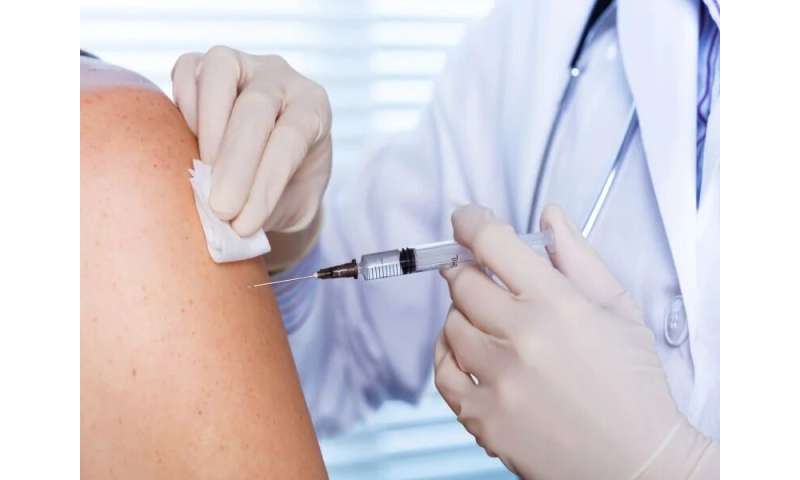
New details surfaced on Thursday on an unexplained neurological condition that struck a volunteer who was participating in AstraZeneca’s coronavirus vaccine trial.
In an internal safety report obtained by CNN, company officials describe how a healthy 37-year-old woman “experienced confirmed transverse myelitis” after receiving her second dose of the vaccine. She was hospitalized on Sept. 5.
The report describes how the patient had the first dose of the coronavirus vaccine in early June and was fine. She received her second dose in late August. While out running on Sept. 2, she “had a trip [not fall] with a jolt.” The report noted that she did not have any obvious injury to her spine when examined, according to CNN.
The next day, the report said, she had difficulty walking, pain and weakness in her arms, pain and reduced sensation in her torso, a headache and reduced ability to use her hands.
The report mentions twice that the woman was diagnosed with “confirmed” transverse myelitis, CNN reported. The condition, which can be triggered by viruses, causes inflammation in the spine.
No other similar cases have been diagnosed among other study volunteers, according to the report. The woman’s neurologist also noted that the woman has started to feel better.
The report, dated Sept. 10, was sent out to doctors who are running the study’s clinical trial sites on Sept. 11, CNN reported.
Last week, AstraZeneca announced the volunteer’s “unexplained illness,” and said it was pausing the trial worldwide. The British and Brazilian arms of the trial have since resumed; the U.S. arm has not.
Dr. Anthony Fauci, director of the U.S. National Institute of Allergy and Infectious Diseases, told CNN this week that it is “just a matter of time” before the trial resumes in the United States.”
He added that he considered the participant’s illness a “one-off” at this point, and that “it would be unusual to completely stop a trial on the basis of one single adverse event.”
He said doctors leading the trial’s U.S. sites will be told to look out for similar symptoms. “You have to be extra special careful and watch out to see if it happens again, and then if it does, it becomes an entirely different situation,” he told CNN.
Coronavirus distribution plan unveiled
Meanwhile, the details of a plan to rapidly deliver a future coronavirus vaccine to Americans were unveiled by federal officials on Wednesday.
Two of the key parts of the plan are to begin distributing a vaccine with 24 hours of any approval or emergency authorization and offering the vaccine for free, The New York Times reported.
Officials from Operation Warp Speed—the multiagency effort to quickly vaccinate Americans against coronavirus— also said the timing of a vaccine was still unclear, the Times reported. That despite repeated statements from President Donald Trump that a shot could be ready before the election on Nov. 3.
“We’re dealing in a world of great uncertainty. We don’t know the timing of when we’ll have a vaccine, we don’t know the quantities, we don’t know the efficacy of those vaccines,” Paul Mango, the deputy chief of staff for policy at the U.S. Department of Health and Human Services, told the Times. “This is a really quite extraordinary, logistically complex undertaking, and a lot of uncertainties right now. I think the message we want you to leave with is, we are prepared for all of those uncertainties.”
Who will get the vaccine first? Initial distribution of a vaccine, possibly on an emergency basis, would to a limited group of high-priority people, such as health care workers, in the final three months of this year and into next year, the Times reported. The Department of Defense is providing logistical support for shipping and storing the vaccine, and for keeping track of who has gotten a vaccine and whether they got the full two doses, the newspaper said.
To achieve this, existing databases would be linked up so that, for example, a patient who received a vaccine at a public health center in January could go to a CVS pharmacy 28 days later in another state and be assured of getting the second dose of the right vaccine, the Times reported.
Right now, three drug makers are testing vaccine candidates in late-stage trials in the United States. One of those companies, Pfizer, has said that it could apply for emergency authorization as early as October, while the other two, Moderna and AstraZeneca, have said they hope to have something before the end of the year.
In a sign that the Pfizer vaccine trials are moving along smoothly, German pharmaceutical company BioNTech, which is developing a coronavirus vaccine with Pfizer, announced Thursday it was buying a new production plant so it can ramp up production of a COVID-19 vaccine when needed, CNN reported.
The vaccine plant in Marburg, Germany, would produce tens of millions more vaccine doses a month—pending regulatory approval, CNN reported. The plant should be up and running by the first half of 2021, BioNTech said in a statement, and the company will retain a highly skilled workforce of 300 employees following the transfer of the plant from Novartis later this year.
New Drug May Help Prevent Severe COVID
A single infusion of an experimental drug dramatically lowers levels of coronavirus in the bodies of newly infected patients and cuts their chances of hospitalization, the drug’s maker reported Wednesday.
Eli Lilly’s announcement did not include detailed data and hasn’t been peer-reviewed or published yet, the Times reported.
The news comes from interim results of a trial sponsored by Eli Lilly and the U.S. National Institutes of Health. NIH officials would not comment on the announcement until they have seen more detailed data from the trial, the Times reported.
How does the drug work its magic? It is a monoclonal antibody, a manmade copy of an antibody produced by a patient who recovered from COVID-19, the Times reported. Scientists around the world have high hopes that that monoclonal antibodies will prove to be powerful coronavirus treatments, but they come with a caveat: They are difficult to manufacture, and would take time to produce, the Times reported.
In the trial, 452 newly diagnosed COVID patients received the monoclonal antibody or a placebo infusion. Some 1.7 percent of those who got the drug were hospitalized, compared with 6 percent of those who received a placebo— a 72 percent reduction in risk, Eli Lilly said.
At the same time, blood levels of the coronavirus plummeted among those who received the drug, and their symptoms were fewer and milder, the Times reported.
This is the first treatment aimed at patients who are not already seriously ill and hospitalized, the newspaper added.
Dr. Myron Cohen, director of the Institute for Global Health and Infectious Diseases at the University of North Carolina at Chapel Hill, told the Times he was impressed by the findings.
“It’s exciting,” said Cohen, who was not involved in the study. The trial appears to be rigorous, and the results are “really compelling,” he added. Other monoclonal antibody drugs to combat the coronavirus are in development, he noted.
“This is the opening of a door,” Cohen said.
Cases keep mounting
By Friday, the U.S. coronavirus case count passed 6.6 million as the death toll passed 197,500, according to a Times tally.
According to the same tally, the top five states in coronavirus cases as of Friday were: California with nearly 777,000; Texas with more than 710,000; Florida with over 674,000; New York with nearly 452,000; and Georgia with over 284,000.
Curbing the spread of the coronavirus in the rest of the world remains challenging.
By Friday, India’s coronavirus case count had passed 5.2 million, just one month after hitting the 3 million mark, the Times reported.
More than 84,000 coronavirus patients have died in India, but when measured as a proportion of the population, the country has had far fewer deaths than many others. Doctors say this reflects India’s younger and leaner population.
Still, the country’s public health system is severely strained, and some sick patients cannot find hospital beds, the newspaper said. Only the United States has more coronavirus cases.
Meanwhile, Brazil posted over 4.4 million cases and nearly 135,000 deaths as of Friday, the Times tally showed.
Cases are also spiking in Russia: The country’s coronavirus case count has passed 1 million, the Times reported. As of Friday, the death toll in Russia was over 19,000.
Source: Read Full Article


